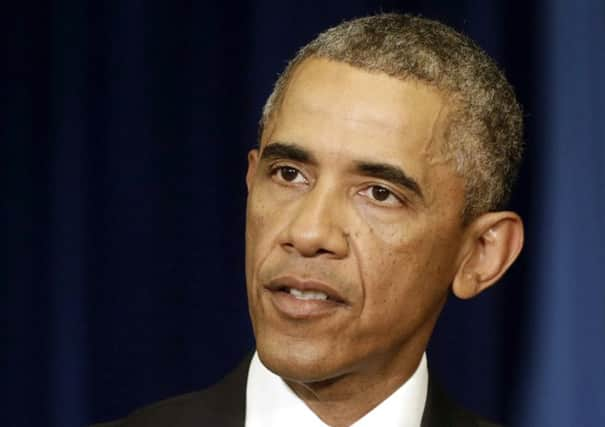Fears for hostage as Obama unveils IS strategy


One defence analyst said last night: “There is going to be a war, plain and simple.”
The expansion of US operations against the terrorists will fuel fears for Scots aid worker David Haines, who was shown being held captive in an IS video last week, in which American journalist Stephen Sotloff was beheaded.
Advertisement
Hide AdAdvertisement
Hide AdThe American president will meet congressional leaders tomorrow and deliver a speech to the American people on Wednesday – the eve of the 13th anniversary of 9/11, the deadliest terrorist attack on US soil.
The US expanded its operations in the region over the weekend, carrying out air strikes on IS for the first time in western Iraq to defend Iraqi troops at Haditha Dam.
The attack was the first in direct support of the Baghdad government since the launch of Washington’s campaign a month ago.
The Pentagon said US aircraft had carried out air strikes near the dam along the Euphrates River in the Anbar province, where Iraqi troops loyal to the Baghdad government and allied Shia militias have for months been fighting IS.
Mr Obama said yesterday: “I just want the American people to understand the nature of the threat and how we’re going to deal with it and to have confidence that we’ll be able to deal with it.”
He added: “We are going to systematically degrade their capabilities. We’re going to shrink the territory that they control. And ultimately we’re going to defeat them.”
Amid speculation that Britain could soon join the air strikes, Chancellor George Osborne said the UK government “reserves the right to take action” to stem any immediate humanitarian crisis on the ground in Iraq. Mr Osborne said “we haven’t ruled things out, but let’s be clear we’re not at that stage today”. He underlined the “direct threat” to British security posed by IS but emphasised the Iraqi government’s role in defeating the organisation.
He said: “We absolutely need to defeat this Islamic terrorist organisation – it is a direct threat to the security of people living in Britain, as well as, of course, an enormous threat to stability in the Middle East.
Advertisement
Hide AdAdvertisement
Hide Ad“It needs to be defeated. There are already American air strikes, but they are in the context of a locally-led operation by the Iraqi people, by other countries in the neighbourhood, so this is very different from ten years or so ago with the Iraq war, where it was a Western invasion.
“This is an operation by the Iraqi government which, by the way, needs to be more representative. It’s an operation from people in the Middle East to destroy this threat, which we will assist in any way that we can and in a way that helps them with their cause.”
The US military has conducted more than 130 air strikes against militants in the past month. In retaliation, the group recently beheaded two American journalists it had been holding hostage in Syria.
Mr Haines, 44, was shown at the end of the execution of Mr Sotloff last week with the warning that he would be the next hostage to be killed if air strikes against IS continue.
Defence analyst Tim Ripley said: “Like Obama, the British Secretary of State and the Prime Minister have made that clear in their comments that they are not going to stop what they are doing for him. It is a very dangerous situation for him, but whether it is any more dangerous than it was before, we don’t know.”
Mr Ripley added: “I think Obama’s direction of travel is pretty clear and whatever he says later in the week, that is detail. He has already made his big announcement – he is going to destroy them.
“There is going to be a war, plain and simple. There is going to be a new war in the Middle East. In fact, it has already started. There have been air strikes already.”
Mr Haines was taken from a refugee camp close to the Syrian border with Turkey in March 2013. He has worked for aid agencies in some of the world’s worst trouble spots, including Libya and South Sudan.
Advertisement
Hide AdAdvertisement
Hide AdPrime Minister David Cameron has ruled out paying a ransom to the militants for Mr Haines’ release, describing such payments as “self-defeating”.
A Nato summit in Wales ended on Friday with Mr Cameron urging a “comprehensive plan” to deal with the increasing threat from IS. But there were some signs of tensions, with UK officials concerned that the US is not putting enough emphasis on involving regional powers and the French indicating they are not prepared to take part in military action in Syria.
Mr Obama insisted Nato members were “unanimous” in their commitment to stamp out the “extremist nihilism” of IS. “We are going to degrade and ultimately defeat ISIL (IS), the same way that we have gone after al-Qaeda,” he told a press conference.
At his own press conference, the Prime Minister said: “My argument is you need that mixture of intelligent politics, diplomatic pressure, long-term engagement in a comprehensive plan as well as the potential for military or other more aggressive action.
“We will proceed carefully, drawing together the partners we need, above all in the region, to implement a comprehensive plan.”
Mr Cameron said Britain was not ready to take offensive military action. He is thought to want to wait until a more inclusive Iraqi government is formed, possibly this week.